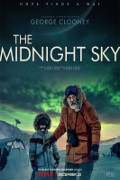
Directed by
George Clooney
122 minutes
Rated PG
Reviewed by
Bernard Hemingway

The Midnight Sky
George Clooney clearly has a thing for movies about deep space. Having already starred in two such, Gravity (2013) and Solaris ( 2002) with The Midnight Sky he both takes the lead role albeit this time keeping his feet on the ground and directs, It is Clooney’s most ambitious effort as a director to date and arguably at least, the best of the trifecta. Having said that it is not an easy film to follow.
Clooney, looking a far cry from his usual debonair image, plays seriously-ill Professor Augustine Lofthouse who is stranded alone in some large abandoned research facility in the Arctic Circle. It’s 2049 and the human race has finally (although, pointedly, it’s not too far off) managed to make Earth uninhabitable as the result of some unspecified cataclysm, perhaps, nuclear. Augustine spends a lot of time alone gazing at the icy wasteland until a young girl, Iris (Caoilinn Springall), who apparently was left behind during the evacuation of the facility, pops up although she cannot, or will not, speak.
At the same time in a parallel story a team of astronauts (Felicity Jones, David Oyelowo, Tiffany Boone, Demian Bichir and Kyle Chandler) who have been on a mission to look for an alternative home for humanity are heading back to Earth unaware that it is no longer liveable. Augustine picks up a signal from them but it is too weak so he takes Iris and heads across country to a weather station that he believes will have a stronger transmitter so that he can warn them not to return.
Clooney’s half of the film, the more successful part, reminded me of Joe Penna’s Arctic (2018). Both films involve a desperate cross country trek over snow-covered wastes by a lone male and his female dependent and rely more on mood than action. Clooney's film also relies on our willingness to accept the life-or-death scenario which some may find rather unrealistic (the seriously sick Augustine would be unlikely to survive a fall through the ice into the sub-zero ocean, a child hardly like to cope with the situation with such equanimity). Perhaps because we’re not sure where the narrative is heading it is easy enough to give ourselves up to it as fuel for a meditation on the precariousness of life, particularly as it is helped by atmospheric cinematography by Martin Ruhe and an effective score by the always impressive Alexandre Desplat
The other half of The Midnight Sky which deals with the equally life-threatening journey of the spaceship is less effective precisely because there is more is going on but with less immediacy. Although the production design is impressive this is all rather generic to the host of films, including the abovementioned Gravity, that have dealt with such things. Indeed the fate of the astronauts is left largely unresolved in favour of Augustine's story.
Running through the film are intermittent flashbacks to what we eventually work out (for it is not readily apparent) are Augustine’s younger days when he was an advocate of a planet he calls K23 as a future home for humanity. As it happens this is where the astronauts are returning to Earth from. Then it turns out that there is a connection between Iris, Felicity Jones’s space mission captain and Augustine. What that connection is I think I understood but how it actually came to be I am not sure. I suspect that if you really want to know you’re going to have to read the novel 'Good Morning, Midnight' by Lily Brooks-Dalton on which the film is based.
Although I have largely focused on the weaknesses of the film (which bombed critically and commercially Stateside), for more reflective armchair adventurers The Midnight Sky is well worth contemplating.
FYI: I assume that that the film is set in 2049 as a nod to Blade Runner 2049 (2017) even though there is no other evident connection.
Want something different?





